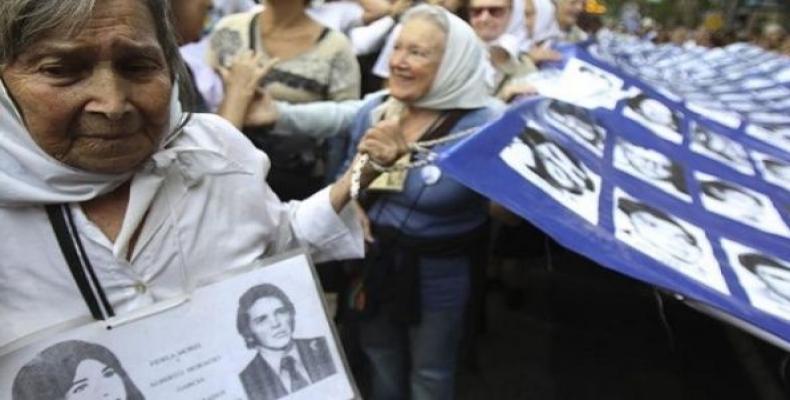Buenos Aires, May 12 (RHC)-- A potentially precedent-setting Supreme Court decision in Argentina has sparked widespread outrage among social movements fighting impunity for dictatorship crimes.
Argentina's Senate has passed a bill aimed at preventing a repeat of a recent controversial Supreme Court decision to apply a law known as "Two for One" to reduce the sentence of a dictatorship-era human rights abuser, establishing that the measure cannot be applied in cases of crimes against humanity.
The Senate supported unanimously with 56 votes the new law that stipulates that the "Two for One" law allowing reduced sentences "is not applicable to criminal conduct that falls into the category of crimes against humanity, genocide or war crimes, according to international law."
The new law aims to prohibit torturers and murderers during the 1976 to 1983 dictatorship who have been convicted of crimes against humanity from benefiting from a reduction in their sentences. Earlier, the lower house of Congress approved a bill to sanction the same law, with one vote against and 43 abstentions after six hours of debate.
The new law also states that a sentence reduction can only be applied when the person was in pre-trial detention between 1994 and 2001, when the former law was still in force before being overturned in 2001.
Amid a nationwide and international outcry urging the government to block the use of the defunct law, President Mauricio Macri said he had "always been against the 'Two for One' law," but didn't refer to the cases under appeal at the moment, saying he praised the country's "independence of powers."
The Supreme Court applied the measure to the case of Luis Muiña, who in 2011 was sentenced to 13 years in prison for being a "co-perpetrator of the crime of illegal deprivation of liberty and torture" in five cases, marking the first time it had been invoked in a case of crimes against humanity, as in the past only common criminals had benefited from the measure.
The Mother and Grandmothers of Plaza de Mayo are among the social organizations leading the movement to reject the Supreme Court's controversial ruling, arguing it is a thinly-veiled way of pardoning the dictatorship-era victims who had a hand in inflicting torture and death on thousands of Dirty War victims.
These human rights groups organized a protest on Wednesday afternoon to reject the court's decision, where they wore their signature white handkerchiefs and demanded justice for the 30,000 victims who were disappeared and murdered during the country's last dictatorship. The Argentinean government has said there were only 7,600 people killed or disappeared during that time, sparking a bigger conflict with human rights organizations.
The "Two for One" law, officially known as Law 24.390, was valid from 1994 until 2001 and determined that defendants who served a pre-trial detention of more than two years would see each day spent in jail after the two-year mark counted as double.
Argentina Blocks Reduced Sentences in Cases of Dirty War Crimes

Related Articles
Commentaries
MAKE A COMMENT
All fields requiredMore Views
- Cuba commemorates 25th anniversary of Elián's return home
- Cuba Denounces U.S. for Denying Visa to Volleyball Team
- New study shows nearly 100,000 Palestinians killed in Israeli genocidal aggression against Gaza
- Statement by the Cuban Ministry of Foreign Affairs: Cuba does not recognize any authority of the Organization of American States
- Cuban president marks second day of official visit to Belarus

